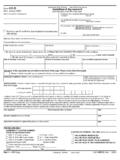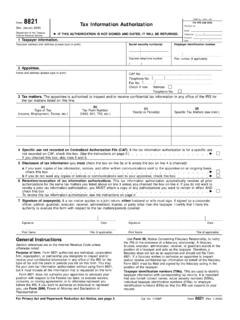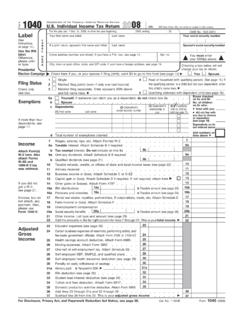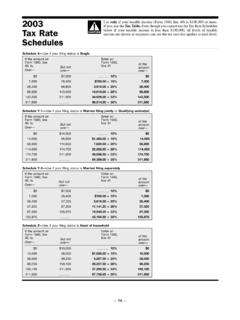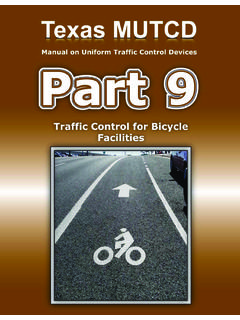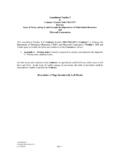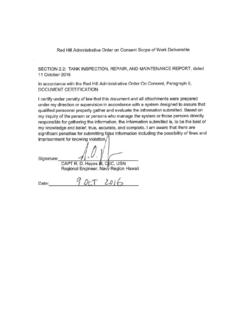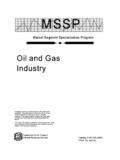Transcription of This page intentionally left blank. - UncleFed
1 this page intentionally left OF CONTENTSP reface ..vii Chapter 1, Industry Industry Industry Impact of State Regulation and State Titling Issues and Automobile Initial Sources on Used Car 1-18 Chapter 2, Accounting MethodsGeneral Change of Chapter 3, Gross ReceiptsIntroduction to Gross Internal Miscellaneous Income ..3-2 Fee Rebate Warranty Dealer Sales Taxes, Registration & Licensing Non-Taxable Income ivState Departments of Transportation/Motor Chapter 4, COST OF GOODS SOLD/INVENTORYI ntroduction to Cost of Goods Inventory Accounting Cost Basis of a Trade-in.
2 4-12 General Audit Techniques ..4-13 Specific Audit ..4-17 Sample 5, Balance SheetIntroduction to Balance Accounts Loans to Loans Versus Constructive Fixed Assets ..5-5 Loans From Short Term Other Current Deferred Income Accounts ..5-8 Retained 6, Expense Issues Advertising Dues and vInterest Expense ..6-5 Legal and Employee Freight and Commissions and Demonstration Insurance Health Service Contracts (Extended Service Warranty).
3 6-12 Corporate Owned Life Work or and 7, Required Filing ChecksGeneral Form ..7-2 Employee/Independent Contractor Chapter 8, Related Finance CompaniesOverview ..8-1 Economic Reasons ..8-1 Validity or Form of Economic Substance ..8-4 Issue this page intentionally left Independent Used Car Dealer MSSP Guide is a joint effort by the Internal RevenueService and the National Independent Automobile Dealers following have contributed to the development of the Independent Used Car DealerMSSP Guide.
4 National Independent Automobile Dealers AssociationInternal Revenue Service Jacksonville DistrictInternal Revenue Service Milwaukee DistrictInternal Revenue Service Richmond DistrictInternal Revenue Service Denver DistrictMotor Vehicle Industry Specialization Program TeamInternal Revenue Service National OfficeThis page intentionally left 1 INDUSTRY BACKGROUNDINTRODUCTIONThe used car industry, as with any industry has certain business practices that are usedthroughout the industry. A key to a successful examination of a used car dealer is anunderstanding of these basic common practices.
5 INDUSTRY JARGONC ertain jargon is widely used in the industry. The terms defined in Exhibit 1-1 are themost commonly found terms. However, even these terms may vary from region toregion. Nevertheless, the list may be useful in understanding how the industryoperates. Become familiar with these terms as many of the terms listed here are usedthroughout the Audit Technique OVERVIEWThe used car industry is comprised of two major segments. The first segment is madeup of the new car dealers who accept trade-ins on the sale of new automobiles; orpurchase used cars from customers, used car dealers, or wholesale auto auctions.
6 Thenew car dealers then sell the used cars either to wholesalers, directly to used cardealers, through auctions, or to other miscellaneous customers. The second segment of the industry is made up of independent auto dealers; a dealernot affiliated with an auto maker, whose principal business is the sale of used cars. Since no trade franchise (that is, General Motors, Ford, etc.) is necessary, the size ofthe used car dealer and the capital required to enter the industry varies. However,every dealer must be licensed with the state in which the dealership is physicallylocated.
7 Most states have different laws that govern the ability of individuals orbusinesses to sell used cars without a license. For example, one state permits anindividual to sell up to five cars per year without obtaining a license. Other states aremore or less restrictive. Independent auto dealers acquire cars from trade-ins on the sale of used vehicles,purchase used cars from customers, other new and used car dealers, or wholesale orretail auctions. They may also make private purchase arrangements with individualswho do not purchase a car from the , independent dealers maintain one or more sales locations where they keeptheir inventory.
8 Most of these dealers are engaged in retail sales. For an independentdealer, sales and delivery of the car generally occur on site. The principal source ofsales is individual customers, although dealers frequently, for various reasons, sellautomobiles to other dealers or through auctions. The retail dealers may also sell carson make up a smaller second segment of the used automobile trade. Thesedealers do not sell to the general public, and generally do not have a sales lot. Awholesaler buys vehicles from retail dealers and either sells them directly to other retaildealers or takes the cars to auction.
9 They may also purchase vehicles at auction forsale to retail dealers. Some wholesalers also purchase vehicles from public sourcessuch as estates, fleets, businesses, and in response to newspaper ads, sales lot used by an independent dealer can generate a significant amount of activitywhich either produces no sale or is not related to a sales transaction. For example,customers frequently browse just to get an idea of what is available, or may visit thelot several times before buying a car. Since most independent dealers do not repair customer cars after the customer'spurchase, there is normally no service department.
10 However, many dealers maintain amechanic or have reconditioning facilities to prepare newly acquired vehicles forresale. Impact of State Regulation and State LawEvery state regulates the operations of the independent dealers, therefore,requirements vary from state to state. Without knowing which state or states areinvolved, it is impossible to outline what specific requirements are imposed on adealer. Common dealer transactions that will vary from state to state include: Transfers, assignments, and reassignments of titles Title transfer processes Collection and repossession rights and liabilities Consignment rules and procedures Payments of commissions for referring buyers Documentation for sales and about the specific state requirements or rules can be obtained from thesources listed at the end of this chapter.
